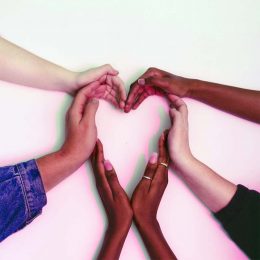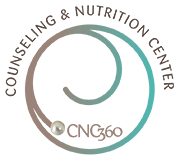by Kelsey Rigopoulos, RDN, LDN
National Eating Disorders Awareness Week (EDAW) and its theme, “Come as You Are: Hindsight is 20/20,” is fresh  on my mind. I propose we take this awareness one step further and talk openly about the elephant in the room: stigma. EDAW is essential for building awareness, and hopefully prevention, but it’s not fulfilling its purpose without also discussing the presence of stigma and discrimination in the eating disorder world.
on my mind. I propose we take this awareness one step further and talk openly about the elephant in the room: stigma. EDAW is essential for building awareness, and hopefully prevention, but it’s not fulfilling its purpose without also discussing the presence of stigma and discrimination in the eating disorder world.
As someone who has been on both a personal and professional side of the illness, I’ve seen eating disorders from all angles. As a loved one of someone struggling, I observed ways that people misunderstand, and pass judgment – No, you don’t “wish you were anorexic” so you could “lose weight that easily.” No, my mother’s part time job as an aerobics instructor did not cause the eating disorder. No, she cannot simply play another 20 minutes of this soccer game against the doctor’s advice. As a professional, the pure lack of information and assumptions that I hear are similar – No, not only thin people struggle with restriction. No, this isn’t an illness that gets better overnight. No, this isn’t a choice of any of my clients to suffer such turmoil.
As both human and dietitian, I could easily list all of the ways we need to better understand eating disorders and treat those who struggle with them; however, in light of knowing that everyone’s lived experience is their own truth, I went to the real pros – my clients. I asked some of my clients, all in different recovering places, to answer one question:
“If you could have people know/understand one thing about eating disorders, what would it be?”
As I should have expected, I didn’t get just one answer each (all of you overachievers)! The best way to open yourself to new information, others’ truths, and feel empowered to better approach those you know who struggle, is to hear it directly from those who live it every day.
- Eating disorder behaviors can sometimes present in challenging and difficult-to-love ways. Please don’t give up on your loved one. They didn’t choose to have an eating disorder (and you didn’t cause it, either).
- Remember to team up with that person and fight against [the] Ed… don’t team up with [the] Ed and fight against your loved one.
- Those of us that suffer need support from people who are willing to fight this illness WITH us – and recovery can come quicker when we have unconditional support.
- Don’t assume that just because someone is weight restored or symptom free that they are healed. Recovery is about so much more than that.
- Check in and continue to check in about our treatment or recovery. And while you are doing so, remember that we are so much more than our illness. Our struggle may be part of our story – but not the entirety.
- I wish people knew that I, and many others with eating disorders understand that it is not safe but there is a part of our heads that don’t let that logical side win.
- I wish people knew that eating disorders don’t always start in order to lose weight and to feel attractive.
- I wish that people knew that having an eating disorder is not a choice. When my eating disorder started, I didn’t even know that it was an eating disorder.
- I wish that people knew that diets are forms of disordered eating that [can] turn into eating disorders.
- I wish people knew that those that struggle with eating disorders do not have “great self-control.”
- I wish people knew that sometimes we feel as if we have nothing besides our eating disorders. Eating disorders are sets of behaviors, but when you are wrapped in your ED you feel safe, you feel as if you can handle anything thrown your way, and you feel as if you have a friend.
- I wish that people knew that as someone with an eating disorder, I love food.
- I wish people understood how scary eating disorders can be. What is the scariest about this eating disorder is [the idea of] never recovering. I wish people knew how badly we do not want to be consumed in these thoughts. How badly I want to be myself again.
- From someone who has suffered from an eating disorder for many years, I wish people understood that developing an eating disorder is not a choice, and the disease is really not about food.
- The behaviors associated with eating disorders are coping mechanisms for an individual to manage underlying anxiety, depression, OCD, etc., and they become an unconscious way of living.
- I want people to know that when I’m deep in my eating disorder, how I act never really has anything to do with them, or really the food. It’s a constant battle between myself and neither side is really winning the war.
- It doesn’t matter what my weight is, no number will ever be enough for my eating disorder. I appreciate you trying to help me by expressing things about my weight, but you trying to compare numbers or old weights isn’t helpful.
- YOU CAN HAVE AN EATING DISORDER AT ANY WEIGHT. I don’t need to look a certain way to be diagnosed or struggling with an eating disorder because it’s about the behaviors and damage you are doing to your body, not the weight.
- Every time I go through good spots in recovery and relapses, I always end up learning something new. It’s never about just going in to get medically well and leaving, it’s about learning and relearning new or old coping skills and retraining my body and brain.
- As scary as it is for you to see me unwell, please know, it’s also scary for me.
- It isn’t a choice. Every day I wake up, I enter into a new battle – one within myself.
- Sometimes it’s stronger than I am. But at the end of each day, all I want and all I need, is to be loved through it.
- I am more than a number on a scale. I am more than a number on a BMI chart. I am more than my diagnosis. I am more than a statistic. I am a mother, a wife, an aunt, a daughter, and a friend. And I am living with an eating disorder.
And that folks, is much more powerful and telling than anything I could have provided you as a professional. Eating Disorders do not discriminate and continue to be misunderstood in our diet cultured world. Take a beat, ask questions, learn something, and support those around you. Break the stigma – your efforts and attention matter.
